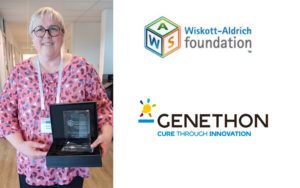Anne Galy receives the WAS Foundation Callahan Award for her work on Wiskott-Aldrich syndrome
The WAS Foundation awarded the Callahan Prize for outstanding service to Anne Galy, head of the Immunology and biotherapies team. She has worked for more than 20 years on Wiskott-Aldrich syndrome, a severe immune deficiency of genetic origin.

“This award is great recognition of the work accomplished and I was very touched to receive it from the hands of Dr Sumathi Iyengar, who has worked so hard to advance research and make treatments available to patients”, rejoices Anne Galy, Inserm research director, head of the Immunology and biotherapies team.
The Callahan Award rewards Genethon’s work which has made it possible to develop a gene therapy for this rare genetic disease, which mainly affects boys and results in haemorrhages, repeated infections and sometimes autoimmune reactions and the development of cancer.
The treatment consists of taking hematopoietic stem cells carrying the genetic anomaly from the patients, then correcting them by introducing the healthy WAS gene using a lentiviral vector developed and produced by Genethon. The corrected cells are then reinjected into the patient previously treated with chemotherapy to eliminate residual diseased cells and allow good engraftment of the treated cells. After reinjection, these stem cells will then give rise to the various cell lines that make up the blood (white and red blood cells, platelets).
The team demonstrated the efficacy and safety of this ex-vivo gene therapy in mouse models of the disease. Genethon then conducted a clinical trial in France (Hôpital Necker, Paris), Great Britain (Great Ormond Street Hospital, London), and in the United States (Children’s Hospital, Boston) including patients with severe forms of the disease. The first long-term follow-up studies (median follow-up 7.6 years) showed the stability of the grafted genetically modified stem cells, which made it possible to correct the main symptoms of the disease and improve the clinical condition of the patients.
Find out more

